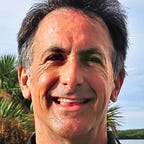Dr. David Hastings Set to Publish Scientific Article on Metal Pollution Off NW Coast of Cuba
Dr. David Hastings announces the planned publication of a scientific article exploring evidence of significant heavy metal pollution in the northern Caribbean.
GAINESVILLE, FL, UNITED STATES , October 8, 2020 /EINPresswire.com/ — Leading marine science expert Dr. David Hastings has presented important data on heavy metal pollution, including mercury, lead, cobalt, and zinc, off the NW coast of Cuba that will be published in the scientific literature. A retired college professor from Florida, Dr. Hastings reveals more about the situation and further touches on other areas of marine conservation as he calls for greater action to preserve the world’s ocean environments.
“I have collected important data on heavy metal pollution off the coast of Cuba,” reveals Dr. David Hastings, a retired college professor, speaking from his home in Gainesville, Florida.
Dr. David Hastings is a marine geochemist, chemical oceanographer, and retired college professor who relocated to Tampa Bay, Florida, in 2000 to teach marine science and chemistry at Eckerd College. A prestigious liberal arts institution, Eckerd College is located in St. Petersburg, 150 miles south of Dr. Hastings’ current residence in Alachua County.
A marine science expert, retired professor Dr. David Hastings remains passionate about conservation and the preservation of the world’s oceans. According to Dr. Hastings, many harmful pollutants are in the form of chemical elements that come from human activities including mining, various industrial processes, roads, wastewater, and cities. These pollutants typically flow down rivers and are found in the bottom mud close to the mouth of the river. As part of a team, Hastings and others collected sediment samples at 8 sites off the coast of NW Cuba. They were able to date the samples and assign a date to different depths.
His results reveal that cobalt, nickel, copper, zinc, mercury, and lead, elements of special concern due to their toxicity, increase significantly in most sediments over the past 80–100 years.
“It is imperative that we work to combat the damage that’s currently being done to the world’s precious marine environments, such as in the northern Caribbean, where, off the coast of Cuba, there is evidence of metal pollution over the past several decades,” explains the expert.
Evidence has been detected of numerous metal pollutants off the coast of Cuba, according to Dr. David Hastings, believed to be the result of mining and other associated endeavors in the region. “We must not overlook this,” suggests the expert, “particularly owing to Cuba’s location in the northern Caribbean — a meeting point for the wider Caribbean Sea, the Gulf of Mexico, and the vast Atlantic Ocean.”
Dr. David Hastings has written extensively on the subject of marine conservation, and, he says, firmly believes in the importance of actively engaging in conversations with elected officials to ensure the future of the planet and its oceans. “It’s vital that we act now,” says Dr. Hastings, “including here in Florida, in Cuba, and elsewhere around the world, to tackle the worst threats currently posed to the planet’s marine environments.”
Retired professor and marine science expert Dr. David Hastings has led regular research cruises in Florida’s coastal waters for more than a decade. “In more recent years, during the routine collection of plankton and water samples, I began to witness more and more small pieces of plastic waste appearing” Dr. Hastings reveals.
This led the retired professor to undertake a study that would, late last year, see the marine science expert estimate the presence of more than four billion microplastic particles in the waters of Florida’s Tampa Bay alone. News of the study will, Dr. David Hastings hopes, result in greater calls for action in the region, and positively influence future decisions surrounding marine conservation in the Tampa Bay area and beyond.
Further details of Dr. David Hastings’ latest scientific article, meanwhile, on metal pollution off the coast of Cuba, are expected to be made available after publication of the article, in the next few months.
Caroline Hunter
Web Presence, LLC
+1 786–233–8220
email us here
